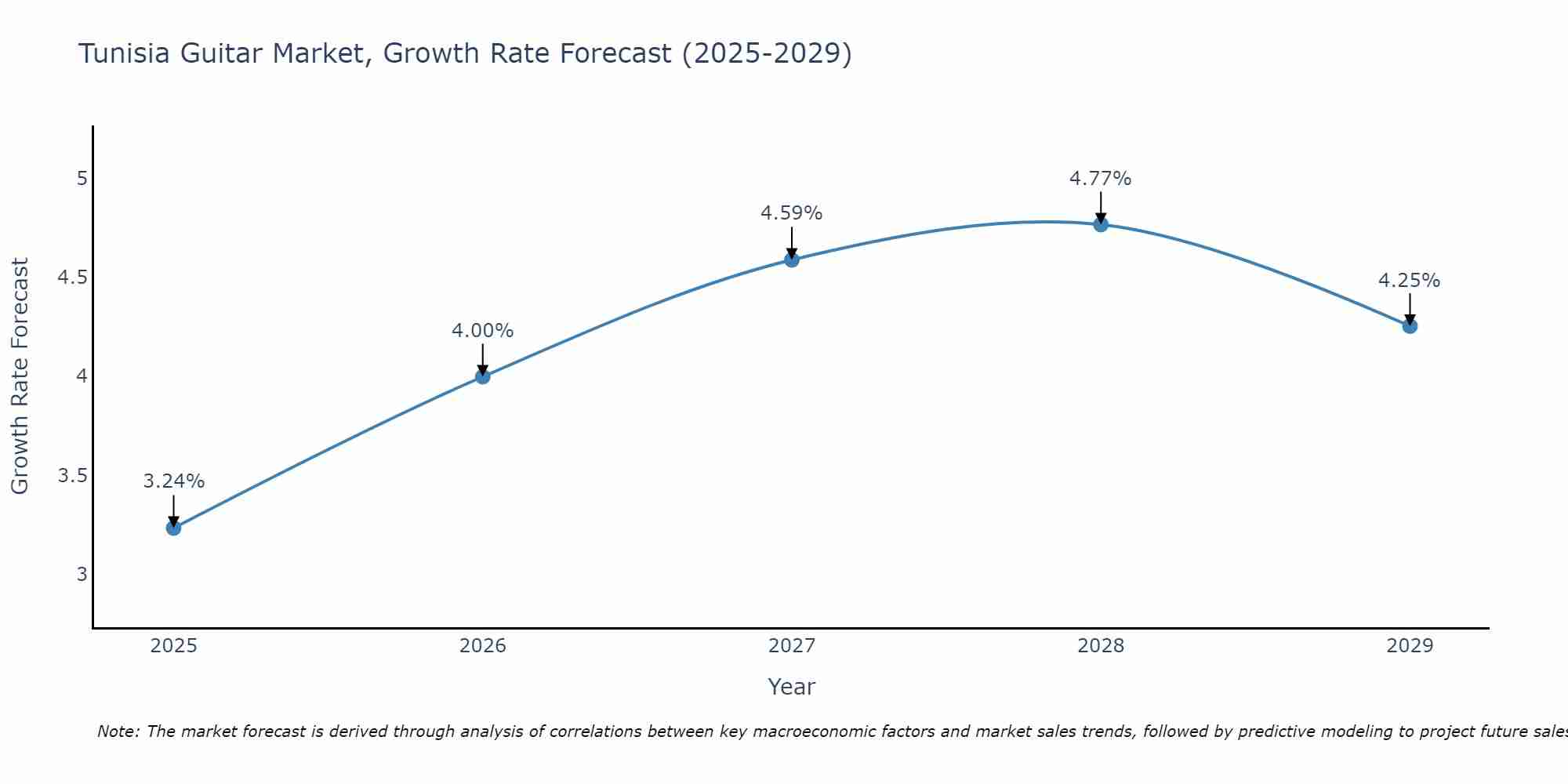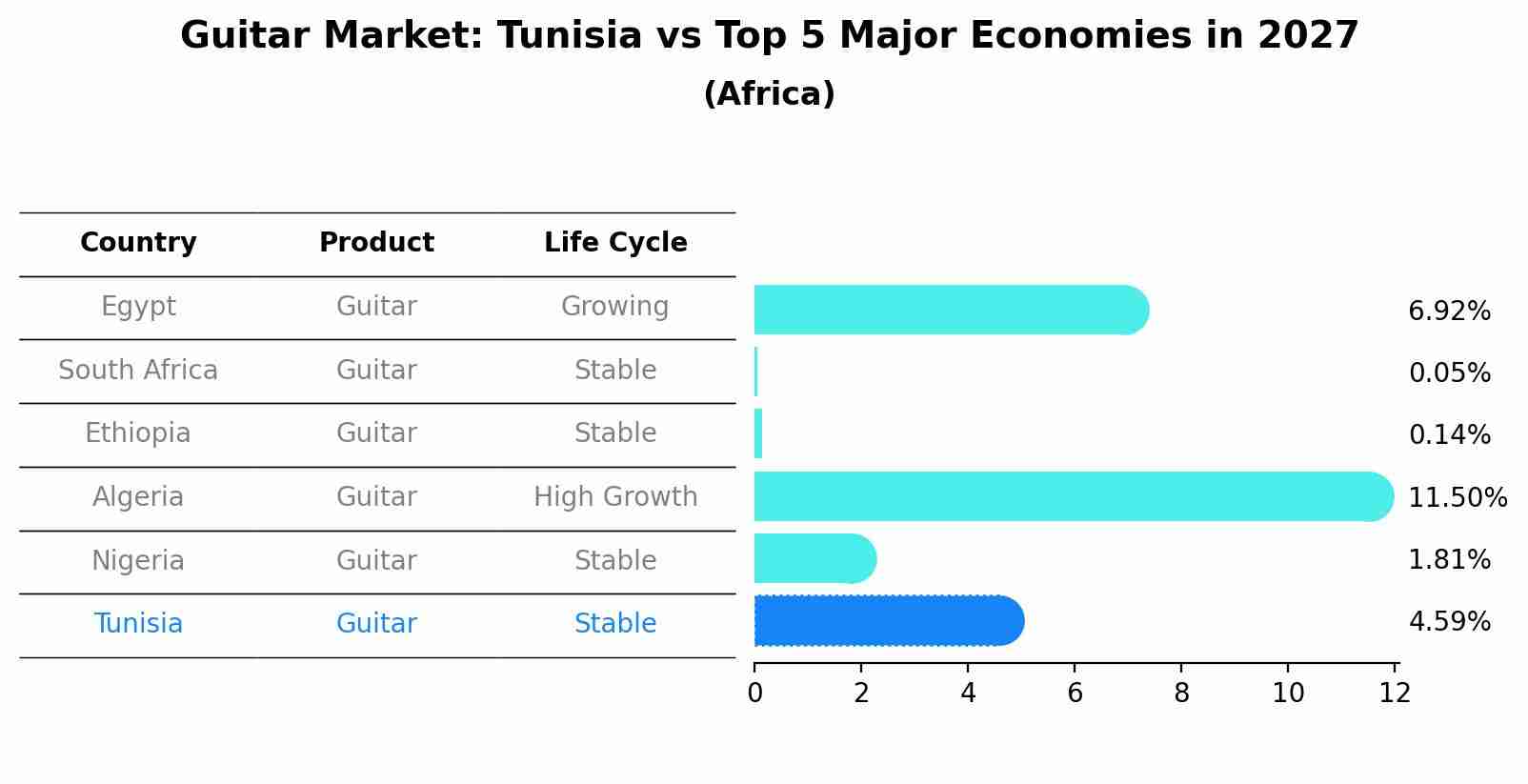Tunisia Guitar Market (2025-2031) Outlook | Value, Trends, Industry, Analysis, Growth, Revenue, Size, Forecast, Companies & Share
| Product Code: ETC226434 | Publication Date: Aug 2022 | Updated Date: Aug 2025 | Product Type: Market Research Report | |
| Publisher: 6Wresearch | Author: Ravi Bhandari | No. of Pages: 75 | No. of Figures: 35 | No. of Tables: 20 |
Tunisia Guitar Market Size Growth Rate
The Tunisia Guitar Market is projected to witness mixed growth rate patterns during 2025 to 2029. The growth rate begins at 3.24% in 2025, climbs to a high of 4.77% in 2028, and moderates to 4.25% by 2029.

Guitar Market: Tunisia vs Top 5 Major Economies in 2027 (Africa)
Tunisia's Guitar market is anticipated to experience a stable growth rate of 4.59% by 2027, reflecting trends observed in the largest economy Egypt, followed by South Africa, Ethiopia, Algeria and Nigeria.

Tunisia Guitar Market Overview
The Tunisia Guitar Market is growing steadily, driven by increasing interest in music education and performance among the population. The market primarily consists of acoustic and electric guitars, with a rising trend towards electric guitars among younger musicians. International brands such as Fender, Gibson, and Yamaha dominate the market, but there is also a growing demand for locally-made guitars crafted by Tunisian artisans. Music stores in major cities like Tunis and Sousse are key distribution channels for guitars, catering to both professional musicians and beginners. With a strong cultural heritage of music and a growing appreciation for Western music genres, the Tunisia Guitar Market presents opportunities for both international and domestic guitar manufacturers to tap into this evolving market.
Tunisia Guitar Market Trends
The Tunisia guitar market is experiencing a rise in popularity, driven by a growing interest in music among the younger population. There is a trend towards the purchase of electric guitars, particularly models from well-known brands offering a wide range of tones and features. Additionally, there is a demand for acoustic guitars, with an emphasis on quality craftsmanship and tonewoods. Online sales of guitars are increasing, as consumers seek convenience and a wider selection of products. Guitar accessories such as pedals, straps, and cases are also in demand, reflecting the desire for personalized and enhanced playing experiences. Overall, the Tunisia guitar market is dynamic, with a mix of traditional and modern preferences shaping consumer behavior.
Tunisia Guitar Market Challenges
In the Tunisia Guitar Market, some key challenges include limited access to high-quality instruments due to import restrictions and high tariffs, resulting in limited choices for consumers. Additionally, there is a lack of specialized guitar stores and repair services, making it challenging for musicians to find the necessary resources and support for their instruments. Furthermore, the relatively high cost of guitars compared to average income levels in Tunisia can be a barrier to entry for aspiring musicians. The market also faces competition from other musical instruments and digital platforms, which offer alternative ways for individuals to engage with music. Overall, improving access to a wider range of affordable guitars, investing in specialized music stores, and providing more educational resources could help address these challenges and grow the guitar market in Tunisia.
Tunisia Guitar Market Investment Opportunities
The Tunisia guitar market presents promising investment opportunities due to the growing interest in music and rising disposable income levels among consumers. With a strong cultural appreciation for music and a burgeoning music scene, there is a demand for high-quality guitars, accessories, and music education services. Investors can explore opportunities in importing and distributing international guitar brands, setting up guitar retail stores, offering guitar lessons and workshops, or organizing music events and festivals. Collaborating with local musicians and music schools can also create synergies and enhance market presence. Additionally, leveraging digital platforms for online sales and marketing can help reach a wider audience and drive growth in the Tunisia guitar market.
Tunisia Guitar Market Government Policy
The Tunisian government has implemented various policies to support the guitar market in the country. These include providing tax incentives and subsidies to guitar manufacturers, promoting local craftsmanship and artistry through cultural initiatives, and supporting music education programs to cultivate a new generation of guitar players. Additionally, the government has been actively involved in organizing music festivals and events to showcase Tunisian guitar talent both domestically and internationally, boosting the visibility and demand for locally-made guitars. Overall, these policies aim to stimulate growth and innovation within the Tunisian guitar market, contributing to the cultural and economic development of the country`s music industry.
Tunisia Guitar Market Future Outlook
The future outlook for the Tunisia Guitar Market appears promising due to a growing interest in music education and performance in the country. With a rising number of music schools, cultural events, and a burgeoning music industry, the demand for guitars is expected to increase. Additionally, the influence of Western music styles and pop culture is driving the popularity of guitars among the youth demographic. As disposable incomes rise and consumer preferences shift towards leisure activities, the market for guitars is likely to expand further. However, market players will need to adapt to changing consumer trends, such as the increasing preference for online purchasing and digital learning platforms, to remain competitive in this evolving landscape.
Key Highlights of the Report:
- Tunisia Guitar Market Outlook
- Market Size of Tunisia Guitar Market, 2024
- Forecast of Tunisia Guitar Market, 2031
- Historical Data and Forecast of Tunisia Guitar Revenues & Volume for the Period 2021 - 2031
- Tunisia Guitar Market Trend Evolution
- Tunisia Guitar Market Drivers and Challenges
- Tunisia Guitar Price Trends
- Tunisia Guitar Porter's Five Forces
- Tunisia Guitar Industry Life Cycle
- Historical Data and Forecast of Tunisia Guitar Market Revenues & Volume By Type for the Period 2021 - 2031
- Historical Data and Forecast of Tunisia Guitar Market Revenues & Volume By Acoustic Guitars for the Period 2021 - 2031
- Historical Data and Forecast of Tunisia Guitar Market Revenues & Volume By Electric Guitars for the Period 2021 - 2031
- Historical Data and Forecast of Tunisia Guitar Market Revenues & Volume By Application for the Period 2021 - 2031
- Historical Data and Forecast of Tunisia Guitar Market Revenues & Volume By Online Retail for the Period 2021 - 2031
- Historical Data and Forecast of Tunisia Guitar Market Revenues & Volume By Offline Retail for the Period 2021 - 2031
- Tunisia Guitar Import Export Trade Statistics
- Market Opportunity Assessment By Type
- Market Opportunity Assessment By Application
- Tunisia Guitar Top Companies Market Share
- Tunisia Guitar Competitive Benchmarking By Technical and Operational Parameters
- Tunisia Guitar Company Profiles
- Tunisia Guitar Key Strategic Recommendations
Frequently Asked Questions About the Market Study (FAQs):
1 Executive Summary |
2 Introduction |
2.1 Key Highlights of the Report |
2.2 Report Description |
2.3 Market Scope & Segmentation |
2.4 Research Methodology |
2.5 Assumptions |
3 Tunisia Guitar Market Overview |
3.1 Tunisia Country Macro Economic Indicators |
3.2 Tunisia Guitar Market Revenues & Volume, 2021 & 2031F |
3.3 Tunisia Guitar Market - Industry Life Cycle |
3.4 Tunisia Guitar Market - Porter's Five Forces |
3.5 Tunisia Guitar Market Revenues & Volume Share, By Type, 2021 & 2031F |
3.6 Tunisia Guitar Market Revenues & Volume Share, By Application, 2021 & 2031F |
4 Tunisia Guitar Market Dynamics |
4.1 Impact Analysis |
4.2 Market Drivers |
4.2.1 Increasing interest in music education and self-expression among the Tunisian population |
4.2.2 Growing popularity of Western music genres leading to higher demand for guitars |
4.2.3 Rise in disposable income and willingness to spend on musical instruments |
4.3 Market Restraints |
4.3.1 High import tariffs and taxes on musical instruments, including guitars, affecting affordability |
4.3.2 Limited availability of quality guitars and accessories in the Tunisian market |
4.3.3 Cultural preferences for traditional music instruments over guitars |
5 Tunisia Guitar Market Trends |
6 Tunisia Guitar Market, By Types |
6.1 Tunisia Guitar Market, By Type |
6.1.1 Overview and Analysis |
6.1.2 Tunisia Guitar Market Revenues & Volume, By Type, 2021 - 2031F |
6.1.3 Tunisia Guitar Market Revenues & Volume, By Acoustic Guitars, 2021 - 2031F |
6.1.4 Tunisia Guitar Market Revenues & Volume, By Electric Guitars, 2021 - 2031F |
6.2 Tunisia Guitar Market, By Application |
6.2.1 Overview and Analysis |
6.2.2 Tunisia Guitar Market Revenues & Volume, By Online Retail, 2021 - 2031F |
6.2.3 Tunisia Guitar Market Revenues & Volume, By Offline Retail, 2021 - 2031F |
7 Tunisia Guitar Market Import-Export Trade Statistics |
7.1 Tunisia Guitar Market Export to Major Countries |
7.2 Tunisia Guitar Market Imports from Major Countries |
8 Tunisia Guitar Market Key Performance Indicators |
8.1 Number of music schools and academies offering guitar lessons in Tunisia |
8.2 Online search trends for guitar-related keywords in Tunisia |
8.3 Participation rates in music festivals and events featuring guitar performances |
9 Tunisia Guitar Market - Opportunity Assessment |
9.1 Tunisia Guitar Market Opportunity Assessment, By Type, 2021 & 2031F |
9.2 Tunisia Guitar Market Opportunity Assessment, By Application, 2021 & 2031F |
10 Tunisia Guitar Market - Competitive Landscape |
10.1 Tunisia Guitar Market Revenue Share, By Companies, 2024 |
10.2 Tunisia Guitar Market Competitive Benchmarking, By Operating and Technical Parameters |
11 Company Profiles |
12 Recommendations |
13 Disclaimer |
- Single User License$ 1,995
- Department License$ 2,400
- Site License$ 3,120
- Global License$ 3,795
Search
Thought Leadership and Analyst Meet
Our Clients
Related Reports
- Afghanistan Apparel Market (2026-2032) | Growth, Outlook, Industry, Segmentation, Forecast, Size, Companies, Trends, Value, Share, Analysis & Revenue
- Canada Oil and Gas Market (2026-2032) | Share, Segmentation, Value, Industry, Trends, Forecast, Analysis, Size & Revenue, Growth, Competitive Landscape, Outlook, Companies
- Germany Breakfast Food Market (2026-2032) | Industry, Share, Growth, Size, Companies, Value, Analysis, Revenue, Trends, Forecast & Outlook
- Australia Briquette Market (2025-2031) | Growth, Size, Revenue, Forecast, Analysis, Trends, Value, Share, Industry & Companies
- Vietnam System Integrator Market (2025-2031) | Size, Companies, Analysis, Industry, Value, Forecast, Growth, Trends, Revenue & Share
- ASEAN and Thailand Brain Health Supplements Market (2025-2031) | Strategy, Consumer Insights, Analysis, Investment Trends, Opportunities, Growth, Size, Share, Industry, Revenue, Segments, Value, Segmentation, Supply, Forecast, Restraints, Outlook, Competition, Drivers, Trends, Demand, Pricing Analysis, Competitive, Strategic Insights, Companies, Challenges
- ASEAN Bearings Market (2025-2031) | Strategy, Consumer Insights, Analysis, Investment Trends, Opportunities, Growth, Size, Share, Industry, Revenue, Segments, Value, Segmentation, Supply, Forecast, Restraints, Outlook, Competition, Drivers, Trends, Demand, Pricing Analysis, Competitive, Strategic Insights, Companies, Challenges
- Europe Flooring Market (2025-2031) | Outlook, Share, Industry, Trends, Forecast, Companies, Revenue, Size, Analysis, Growth & Value
- Saudi Arabia Manlift Market (2025-2031) | Outlook, Size, Growth, Trends, Companies, Industry, Revenue, Value, Share, Forecast & Analysis
- Uganda Excavator, Crane, and Wheel Loaders Market (2025-2031) | Strategy, Consumer Insights, Analysis, Investment Trends, Opportunities, Growth, Size, Share, Industry, Revenue, Segments, Value, Segmentation, Supply, Forecast, Restraints, Outlook, Competition, Drivers, Trends, Demand, Pricing Analysis, Competitive, Strategic Insights, Companies, Challenges
Industry Events and Analyst Meet
Whitepaper
- Middle East & Africa Commercial Security Market Click here to view more.
- Middle East & Africa Fire Safety Systems & Equipment Market Click here to view more.
- GCC Drone Market Click here to view more.
- Middle East Lighting Fixture Market Click here to view more.
- GCC Physical & Perimeter Security Market Click here to view more.
6WResearch In News
- Doha a strategic location for EV manufacturing hub: IPA Qatar
- Demand for luxury TVs surging in the GCC, says Samsung
- Empowering Growth: The Thriving Journey of Bangladesh’s Cable Industry
- Demand for luxury TVs surging in the GCC, says Samsung
- Video call with a traditional healer? Once unthinkable, it’s now common in South Africa
- Intelligent Buildings To Smooth GCC’s Path To Net Zero


















